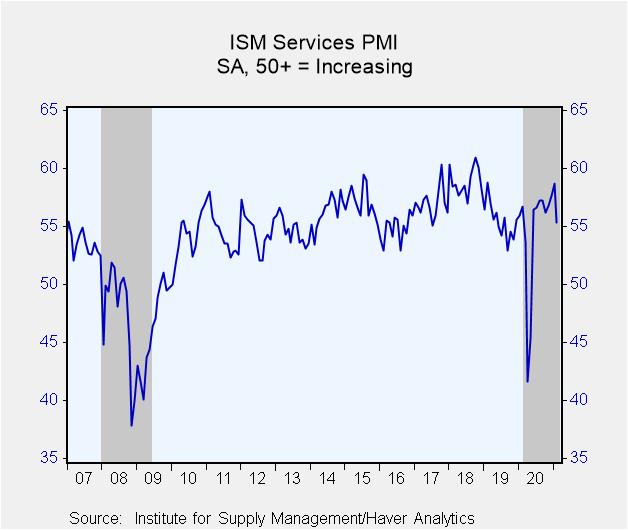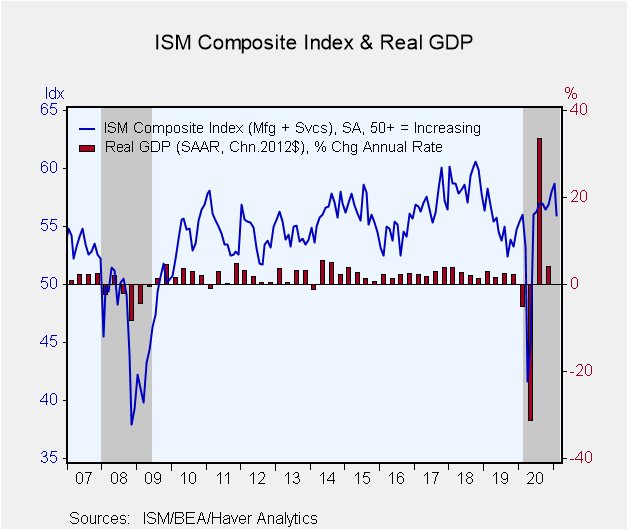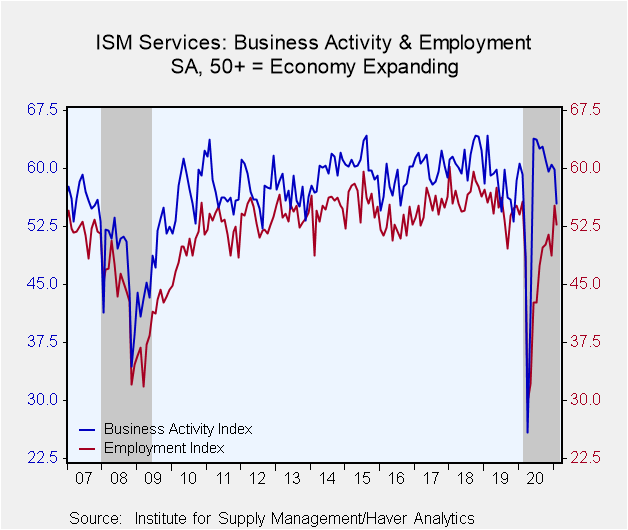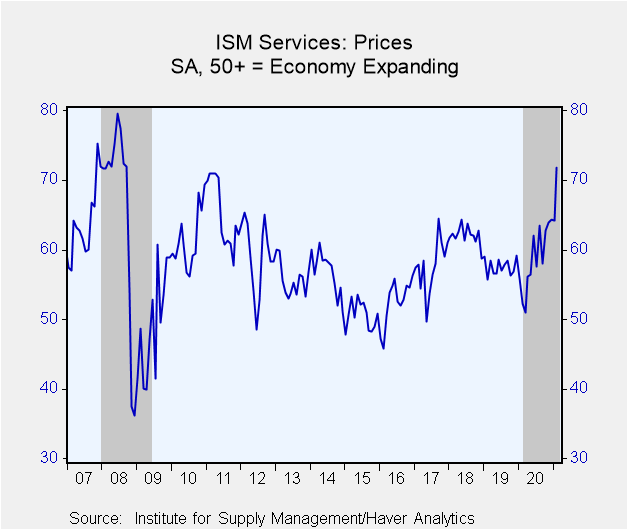 Global| Mar 03 2021
Global| Mar 03 2021U.S. ISM Services Index Weakens in February
by:Tom Moeller
|in:Economy in Brief
Summary
• Service sector activity declines to lowest level since May. • New orders post biggest component drop. • Pricing improves as delivery speeds slow. The Composite Index of Services Activity from the Institute for Supply Management [...]
• Service sector activity declines to lowest level since May.
• New orders post biggest component drop.
• Pricing improves as delivery speeds slow.
The Composite Index of Services Activity from the Institute for Supply Management declined to 55.3 during February after increasing to 58.7 during January. Stability in the index at 58.7 had been expected in the Action Economics Forecast Survey.
Haver Analytics constructs a composite index combining the services index and the manufacturing reading which was released Monday. The composite index declined to 55.9 from 58.7. It also was the lowest level since May. During the last 10 years, there has been a 52% correlation between the index level and the q/q change in real GDP. The composite is based on GDP shares.
Changes in the component series were mixed last month. The new orders index declined to 51.9 from 61.8 during January. It was the lowest level in nine months. The business activity reading weakened to 55.5 from 59.9 in January. The reading remained below its June peak of 63.9. A lessened 26% of respondents (NSA) reported better activity compared to 30% in January and a fewer 15% reported deterioration compared to 19% in January. The employment measure eased m/m to 52.7. It backed away from January's eleven-month high of 55.2 and compared to 29.7 last April. A steady 16% of respondents reported more hiring while an increased 14% reported fewer jobs. Indicating slower delivery speeds, the supplier delivery series increased to 60.8 after backpedaling to 57.8 in January. It has been trending higher for roughly two years.
The prices index surged to 71.8 last month after easing to 64.2 in January. The figure compared to a low of 50.9 in March 2020. A greatly increased 43% of respondents reported higher prices, the most since May 2011, while a greatly lessened three percent reported price declines. The percentage reporting no change in prices fell sharply m/m to 54% and remained well below its 80% high in February of last year.
The export orders series rose sharply to 57.6 and recovered its sharp January decline. The imports index weakened to 50.5, its lowest level since September. The order backlogs index rose to 55.2, up from 48.7 in December. These series are not seasonally adjusted and are not included in the nonmanufacturing composite.
The ISM figures are available in Haver's USECON database, with additional detail in the SURVEYS database. The expectations figure from Action Economics is in the AS1REPNA database.
| ISM Services Survey (SA) | Feb | Jan | Dec | Feb '20 | 2020 | 2019 | 2018 |
|---|---|---|---|---|---|---|---|
| Services PMI | 55.3 | 58.7 | 57.7 | 56.7 | 54.3 | 55.5 | 59.0 |
| Business Activity | 55.5 | 59.9 | 60.5 | 59.2 | 55.8 | 58.0 | 61.6 |
| New Orders | 51.9 | 61.8 | 58.6 | 59.5 | 55.6 | 57.6 | 61.5 |
| Employment | 52.7 | 55.2 | 48.7 | 55.7 | 46.0 | 55.0 | 56.9 |
| Supplier Deliveries (NSA) | 60.8 | 57.8 | 62.8 | 52.4 | 59.7 | 51.5 | 55.8 |
| Prices Index | 71.8 | 64.2 | 64.4 | 52.3 | 58.6 | 57.5 | 62.0 |
| ISM Manufacturing and Services Composite | 55.9 | 58.7 | 58.0 | 56.0 | 54.1 | 55.0 | 58.9 |
Tom Moeller
AuthorMore in Author Profile »Prior to joining Haver Analytics in 2000, Mr. Moeller worked as the Economist at Chancellor Capital Management from 1985 to 1999. There, he developed comprehensive economic forecasts and interpreted economic data for equity and fixed income portfolio managers. Also at Chancellor, Mr. Moeller worked as an equity analyst and was responsible for researching and rating companies in the economically sensitive automobile and housing industries for investment in Chancellor’s equity portfolio. Prior to joining Chancellor, Mr. Moeller was an Economist at Citibank from 1979 to 1984. He also analyzed pricing behavior in the metals industry for the Council on Wage and Price Stability in Washington, D.C. In 1999, Mr. Moeller received the award for most accurate forecast from the Forecasters' Club of New York. From 1990 to 1992 he was President of the New York Association for Business Economists. Mr. Moeller earned an M.B.A. in Finance from Fordham University, where he graduated in 1987. He holds a Bachelor of Arts in Economics from George Washington University.










